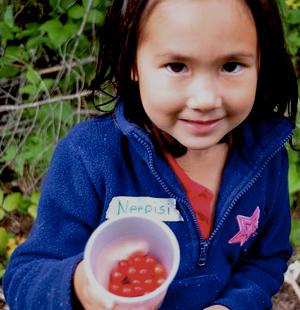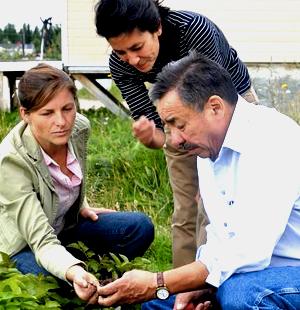

Indigenous peoples have resisted the hegemony of settler society ever since Columbus mistook us for Indians. Our persistence to maintain sovereignty over our lands is a testament to our resilience and strength. But have we put the horse before the cart in our pursuit of sovereignty? It seems to me that we’ve become preoccupied with a political focus i.e. self-government and treaty rights over our lands and resources which has diminished attention to our other values that recognize balance within physical, emotional, and spiritual realms and the interconnectedness of all things. In doing so we neglect the source of our resilience … our spiritual and physical health and wellbeing.
The stakes are extremely high for Aboriginal peoples and our communities are often the only things standing in the path of the powerful and incestuous marriage between the state and resource hungry multinationals. The recent Idle No More movement brought to our attention the fact that the state was employing subterfuge to legislate away the obstacles standing in the path of this unholy union. However, standing shoulder to shoulder, we know they cannot legislate away the constitutional reality that the nuptials cannot take place without our blessings. But can we sustain this fight for sovereignty over our lands if we do not have sovereignty over our bodies from which we draw our strength?
For millennia we have had food security and sovereignty over our food choices, only periodically challenged by seasonal variation and cyclical changes in weather. Our cultural identities were firmly rooted in our food security which relied on our relationship to the land. Colonialism and the Indian Act threatened our food security by severing access to traditional food supplies such as hunting and fishing grounds, and in some cases the total decimation of traditional food sources such as the Buffalo. Our healthy lifestyle was replaced with unhealthy food rations that form the base of Western diets: refined sugar, salt, and flour. As a result Indigenous communities have been ravished by Type 2 diabetes and physically and culturally weakened in our pursuit to defend our interests.
The imposition of Western values over Indigenous food and cultural security continue to persist as the World Trade Organization (WTO) backed by the European Union (EU), in a what has been called a hypocritical move by Inuit seal hunters, recently voted to ban the import of seal products effectively imposing its misguided values which result in weakening a vital source of food and income for coastal and Inuit communities. The EU does not examine its own morals within its own domesticated food industry, a way of killing animals, that many point out, includes the confinement of animals for their entire lives in inhumane conditions.

Today, where most Canadians take for granted the abundance of food, the reality is much different for the Aboriginal population. A 2004 Health Canada survey on nutrition reports that 33.3% of off-reserve Aboriginal households experience food insecurity compared to 8.8% of the non-Aboriginal population. The numbers for on-reserve population are harder to come by as national health surveys generally exclude on-reserve Aboriginals. However, what is certain is that Type 2 Diabetes rates for Aboriginal people on reserves are the highest in the country followed closely by Aboriginal peoples living off reserve.
Research consistently shows that all indicators for health are consistently lower for Aboriginal peoples than those of non-Aboriginal Canadians despite federal policy initiatives such as Health Canada’s Aboriginal Diabetes Health Initiative (ADI). Policy analysis by researchers from the University of Ottawa, published in 2013, show the inefficacy of ADI to date, resulting from the fact that Health Canada often fails to take into consideration the affects of colonization. In other words the failure to accept Aboriginal peoples as equals has resulted in legislation and policy that underfunds government services to Aboriginal peoples, compared to non-Aboriginals in education and health care.

Aboriginal communities are well aware of the mismatch between policy and sustainable solutions. As a result many communities are taking control as best they can with limited resources to improve the health of their community members. Nishnawbe Aski Nation (NAN) is a prime example of a group of communities frustrated by the inability of governments to acknowledge that the problems plaguing their communities are multi-factorial and cannot be a tackled from a narrow perspective that fails to take into account the negative effects of colonialism, the Indian Act, and the systemic racism embedded in Canadian institutions. That being said, they have taken a proactive, flexible and community-based approach to regaining food sovereignty in contrast to the reactive, rigid, top down model of provincial and federal governments.
This year NAN held their fourth annual Food Symposium in Thunder Bay where food system challenges are discussed and community-based solutions are explored. Out of these symposiums NAN has come up with several pilot projects to decrease food insecurity in the hope of re-establishing food sovereignty. Out of these discussions partnerships have evolved with players as seemingly unlikely as Toronto’s Food Share, igniting a fire in community members, and especially in children, that will be difficult to extinguish. Community members have become food advocates and are bringing neighbours on board by introducing food baskets, farmers markets, community gardens and kitchens, school food programs and sport programs.
By producing and harvesting crops, combined with hunting, trapping and fishing, Nishnawbe Aski Nation is reinforcing and strengthening their connection and relationships to the land. Aboriginal peoples have always drawn their health, and spirit from the land – it provides and sustains, and most importantly, it gives us the strength to continue to fight the battles of tomorrow.









